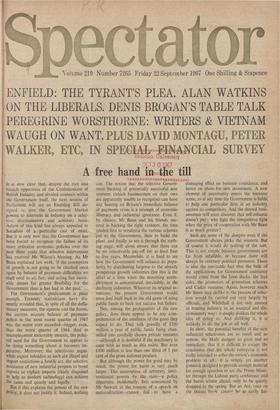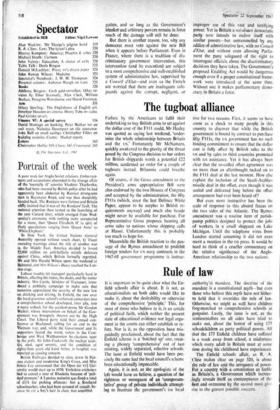It is now clear that, despite the root and branch
opposition of the Confederation of British Industry and divided counsels within the Government itself, the next session of Parliament will see an Enabling Bill de- signed to give the Government blanket powers to intervene in industry on a selec- tive, discriminatory and arbitrary basis. Action of this kind has always appealed to Socialists of a particular cast of mind. But it is only now that the Government has been forced to recognise the failure of its more orthodox economic policies over the paSt three years that selective intervention has received Mr Wilson's blessing. As Mr Benn explained last week, if the resumption of growth is not going to be checked once again by balance of payments difficulties we shall need to at fast: and acting fast inevit- ably means far greater flexibility for the Government than it has had in the past.' ment backing of potentially successful new ventures (which businessmen on their own are apparently unable to recognise) can have any bearing on Britain's immediate balance of payments crisis is a triumph of economic illiteracy and industrial ignorance. Even if, by chance, Mr Bean and his friends suc- ceed in backing the right ventures, the time needed first to scrutinise the various schemes put to the Government, then to build the plant, and finally to see it through the teeth- ing stage, will alone ensure that there can be no conceivable pay-off for at least four to five years. Meanwhile, it is hard to see how the Government will enhance its popu- larity by distributing largesse to the already prosperous growth industries (for this is the idea) at a time when the mounting unem- ployment is concentrated, inevitably, in the declining industries. Whatever its original in- tentions, the present Government would soon find itself back in the old game of using public funds to back not success but failure. gotten, and so long as the Government's blanket and arbitrary powers remain in force much of the damage will still be done.
But there is another reason, too, why any democrat must vote against the new Bill when it appears before Parliament. Even in France, where there is a tradition of dis- criminatory government intervention, this intervention (and its execution) are subject to a most comprehensive and well-established system of administrative law, supervised by a Conseil d'Etat—and even so the French are worried that there are inadequate safe- guards against the corrupt, negligent, or improper use of this vast and terrifying power. Yet in Britain a soi-disant democratic party now intends to endow itself with similar powers—but untrammelled by any edifice of administrative law, with no Conseil d'Etat, and without even allowing Parlia- ment the puny safeguard of the right to interrogate officials about the discriminatory decisions they have taken. The Government's proposed Enabling Act would be dangerous enough even if a proper constitutional frame- work were introduced at the same time. Without one it makes parliamentary demo- cracy in Britain a farce.



































